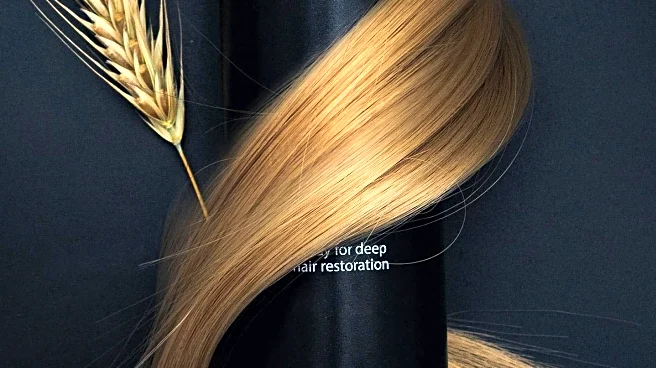What's Happening?
Hair care experts emphasize the importance of regular conditioning for maintaining healthy hair. Dermatologists and stylists agree that while shampoo cleanses the hair, conditioner plays a crucial role
in restoring moisture and protecting hair from damage. Dr. Viktoryia Kazlosukaya and Dr. Maryam Safaee highlight that conditioner smooths and shields hair, preventing breakage and dryness. The frequency of conditioning depends on individual hair types and lifestyles, with most men advised to condition after every wash. Over-conditioning can weigh hair down, particularly for those with fine hair, while those with long or color-treated hair may require more frequent conditioning.
Why It's Important?
Conditioning is vital for maintaining hair health and appearance. It prevents hair from becoming dry, rough, and difficult to style. Regular conditioning helps manage frizz, adds shine, and makes hair easier to brush. For individuals with specific hair conditions like dandruff or seborrheic dermatitis, careful application of conditioner can avoid exacerbating scalp issues. The advice from experts underscores the need for personalized hair care routines based on hair type and lifestyle, ensuring optimal hair health and aesthetics.
What's Next?
Individuals are encouraged to assess their hair type and lifestyle to determine the best conditioning routine. Those with active lifestyles or specific hair conditions may need to adjust their conditioning frequency to maintain hair health. Experts suggest using lightweight formulas for fine hair and more hydrating conditioners for coarse or curly textures. As awareness of personalized hair care grows, consumers may seek products tailored to their specific needs, potentially influencing market trends in hair care products.
Beyond the Headlines
The emphasis on personalized hair care routines reflects broader trends in the beauty industry towards customization and individualization. As consumers become more informed about their specific needs, there is a growing demand for products that cater to diverse hair types and conditions. This shift may lead to increased innovation in hair care formulations and marketing strategies that focus on individual consumer profiles.









